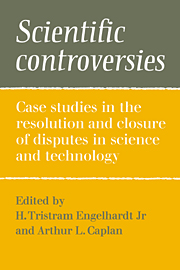 Scientific Controversies
Scientific Controversies Published online by Cambridge University Press: 03 February 2010
Writing in 1921, Norman Campbell answered the question posed in the title of his book What Is Science? with the succinct definition: “Science is the study of those judgements concerning which universal agreement can be obtained”. Two possible objections occurred to him. The first was that “it is notorious that men of science differ among themselves” just as acrimoniously as philosophers and linguists do. He replies:
I do not say that all the propositions of science are universally accepted – nothing is further from my meaning; what I say is that the judgements which science studies and on which its final propositions are based are universally accepted. Difference of opinion enters not with the subject-matter, but with the conclusions that are based on them.
A second objection is that if universal agreement is a necessary condition for the subject matter of science, “a single cantankerous person … could overthrow the whole fabric of science.” His response to this is that such a challenge could come only if the person were lying or suffering from hallucination or sensory defect. After a discussion of these different possibilities, he concludes with some satisfaction:
It is a very remarkable fact that [in such cases] we can always find a test which … enables us to restore universal agreement. It is this fact, which could not be anticipated, which makes science possible, and gives its great importance to the test of universal agreement.
My reason for beginning with Campbell is not to make his view of science a focal point of discussion in this essay.
To save this book to your Kindle, first ensure [email protected] is added to your Approved Personal Document E-mail List under your Personal Document Settings on the Manage Your Content and Devices page of your Amazon account. Then enter the ‘name’ part of your Kindle email address below. Find out more about saving to your Kindle.
Note you can select to save to either the @free.kindle.com or @kindle.com variations. ‘@free.kindle.com’ emails are free but can only be saved to your device when it is connected to wi-fi. ‘@kindle.com’ emails can be delivered even when you are not connected to wi-fi, but note that service fees apply.
Find out more about the Kindle Personal Document Service.
To save content items to your account, please confirm that you agree to abide by our usage policies. If this is the first time you use this feature, you will be asked to authorise Cambridge Core to connect with your account. Find out more about saving content to Dropbox.
To save content items to your account, please confirm that you agree to abide by our usage policies. If this is the first time you use this feature, you will be asked to authorise Cambridge Core to connect with your account. Find out more about saving content to Google Drive.